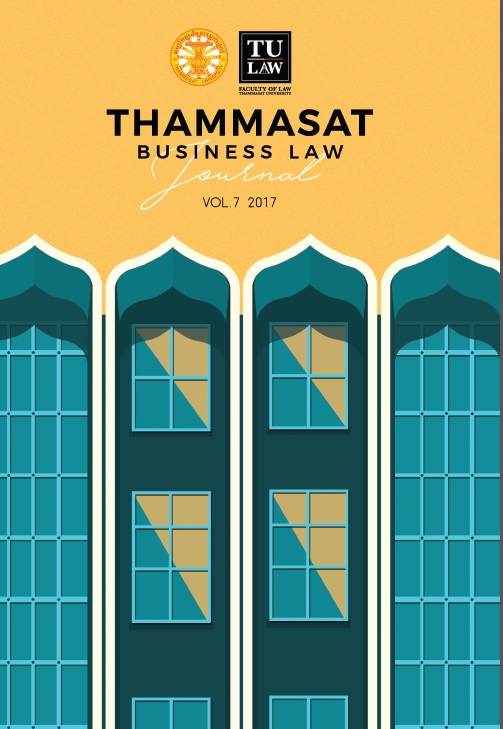BUILDING PRO BONO CULTURE IN THAILAND’S LEGAL BUSINESS AS A CONTRIBUTION TO SUSTAINABLE DEVELOPMENT
Main Article Content
Abstract
Law-related matters and the justice system are complicated. It consists of complex details, rules, and procedures. Not to mention the costs that the users have to pay. To understand and implement the rights in law-related matters and through the justice system, one needs to have the knowledge and a good understanding of the laws, rules, and procedures required. If they do not, they would need to have the resources up to the certain level to afford a legal representative of their own. For many people that do not have either the knowledge or the resources required, their chances to access to justice are almost as good as none.
The justice gap and the problem of unequal access to justice are still in evidence in many countries around the world, including Thailand. While there are many attempts and efforts in tackling such problem; either by the public or the civil society sectors in Thailand, the problem still exists. These problems affect not only the poor people but a wide range of individuals and organizations that cannot afford a legal representative or unable to obtain the help they need due to various factors.
Pro bono has been recognized on an international stage as an effective mean to provide legal services and develop equal access to justice for all. Pro bono is a service that requires specific skills of professionals to provide services to those who are unable to afford them. Although the term ‘pro bono’ may be used by different professionals that involve the offering of free services, it is usually referred to the provision of legal services.
There is no distinctive explanation why there is a low number of pro bono activities in Thailand. However, the author strongly believes that in taking a greater role in supporting and encouraging pro bono culture by the Thai government, the pro bono culture in Thailand’s legal business would grow stronger than ever. Whereas, it would provide the public with a greater chance to implement and protect their right of access to justice. At the same time, lawyers would have their opportunities to fulfill the professional and ethical obligations that they owed to the society while gaining various benefits in business aspects. The State would have the support from the lawyers in providing and enhancing access to justice in Thailand. Also, building pro bono culture in Thailand will further result as a contribution to sustainable development under the 2030 Agenda for Sustainable Development of the United Nations; particularly the Sustainable Development Goal 16.
This article will focus on the limitations of the current legal aid system in Thailand, and the study of pro bono practices and approaches in foreign countries as a model for the development of pro bono culture in Thailand’s legal business.
Article Details
References
Esther F. Lardent. Making the Business Cases for Pro Bono 1. The Pro Bono Institute, 2000.
Chonticha Kiattisuk. People Access to Justice in Court Procedure: Study Case on the Provision of Legal Aid by the Government. Master’s thesis, Faculty of law, Thammasat University, 2011.
Lapp, Kevin and Alexa Shabecoff. Pro Bono Guide: An Introduction to Pro Bono Opportunities in the Law Firm Setting. 2nd ed., Cambridge.
Articles
Esther F. Lardent. “Pro Bono Work is Good for Business.” The National Law Journal (2001).
Jason M. Thiemann. “The Past, The Present, And The Future Of Pro Bono: Pro Bono As A Tax Incentive For Lawyers, Not A Tax On The Practice Of Law.” Hamline Journal of Public Law & Policy (2005): 26.
Ellyn H. Josef. “Is Bigger Better? The Large Law Firm Model of Meeting the Pro Bono Obligation.” South Texas Law Review (2010): 15.
April Faith-Slaker. “What We Know And Need To Know About Pro Bono Service Delivery.” South Carolina Law Review (2016): 67.
Other Materials
The United Nations, ‘Transforming our world: the 2030 Agenda for Sustainable Development’ (A/RES/70/1) (2015)
The American Bar Assisciation, ‘Model Rules Of Professional Conduct: Table of Contents’
The American Bar Assisciation, ‘State-By-State Pro Bono Services Rules’ (2010)
The American Bar Assisciation, ‘State Pro Bono Reporting: A Guide for Bar Leaders and other Considering Strategies for Expanding Pro Bono’
Law Society of Singapore, ‘Annual Report 2015’ (Law Society of Singapore, 2015)
‘Singapore Statutes Online - Legal Profession (Mandatory Reporting of Specified Pro Bono Services) Rules 2015’ (Statutes.agc.gov.sg, 2015)


